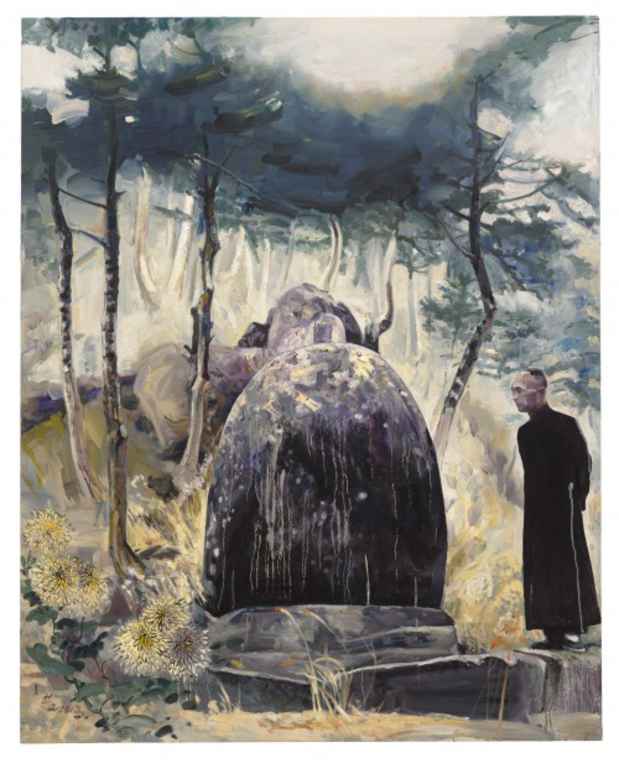Hung Liu “Qian Shan: Grandfather’s Mountain”
Nancy Hoffman Gallery

This event has ended.
Nancy Hoffman Gallery presents a Hung Liu show entitled “Qian Shan: Grandfather’s Mountain”.
Hung Liu’s grandfather, Liu Weihua - who helped raise and educate her - was China’s most important scholar on the subject of “Qianshan,” a cluster of mountain peaks (nearly one thousand) in Northern China in which Taoist and Buddhist monasteries have co-existed for centuries. From his first trip there in 1919 as a student, he fell in love with the majesty of the place: with it’s interwoven peaks and forests, its stairways leading to secluded temples and monastic dwellings, its upright stone steles etched with memorial and historical texts, its stone bridges leading to lonely caves, its narrow trails carved in rock ascending sacred peaks where penitents seek redemption, and he fell in love especially with its ascetic detachment from the modern world.
Throughout his adult life, and despite the facts that he was a school teacher and had a family (a wife, three girls and a boy) in Changchun (moving in the late 1950s to Beijing), Liu Weihua visited Qianshan at every opportunity, studying its temples, shrines, monasteries, and the written signs and couplets that adorned them. He collected words of wisdom left by past literati, including poetry, journals, steles, and other writings. When new discoveries were brought to his attention, he visited Qianshan and recorded them personally.
Often, he hired a photographer to document his journeys, shooting over 380 photographs of local sights, preserving Qianshan’s history and scenery, and recording the monastic lives of its priests and nuns. He also had himself photographed in Qianshan, almost as if he were a monk wandering contemplatively among the monasteries.
Now, in honor of her grandfather’s scholarly work, Hung Liu has completed a new body of paintings based on photographs taken during his many research trips to Qianshan. The exhibition at the Nancy Hoffman Gallery in New York is called “Qianshan: Grandfather’s Mountain.” Liu is well known for basing her large, often drippy oil paintings on Chinese historical photographs, often of young prostitutes or war refugees, and her subjects are usually anonymous, lost to history. With her new paintings, “Qianshan: Grandfather’s Mountain,” Liu works from photographs that her grandfather commissioned, either of the landscape, religious sites or shrines, the monks and nuns who lived there, or, very often, of himself posing like a scholar tourist in his personal heaven-on-earth. As a painter, Liu is trying to bring his photographs into the 21st century as contemporary oil paintings.
The Wall Street Journal recently called Hung Liu “the greatest Chinese painter in the U.S.,” and one of the reasons why is because of the depth of her connection with the culture and history of China. That connection runs not only through her own life, but through the lives and experiences of her mother and grandfather (who was born during the Qing Dynasty). As an artist, Liu has always tried to turn old photographs into new paintings, adding a certain “mineral” urgency to a decaying “chemical” surface. With “Qianshan: Grandfather’s Mountain,” she makes clear the depth of her family’s memory of the old, literati traditions of China with paintings that reawaken her grandfather’s dream of being what the Chinese called “Jushi” (lay Buddhist), or a monk with a family.
Liu’s recent career retrospective at the Oakland Museum of California was called “Summoning Ghosts: The Art and Life of Hung Liu.” Throughout her career, the grainy anonymity of her historical subjects, whose fleeting images were captured in old photographs, were the ghosts she set free in her paintings. There were many ghosts in Hung Liu’s life: Mao Zedong, whose omnipresent visage made private life impossible; Liu’s father, a Captain in the Nationalist army who was taken away by the Communists in 1948 (and did not see his daughter again until 1994); her mother, who was both mother and father, and who died in 2011; and her grandfather, who - although he died in 1962 - remained the most inspiring figure in her life.
Liu Weihua’s book on Qianshan was finally published in 2002 in China, 40 years after his death, 70 some years after he started his research.
Hung Liu, with husband Jeff Kelley and mother Liu Zongguang (Liu Weihua’s daughter) visited Qian Shan in the early summer of 2006
.- Jeff Kelly
[Image: Hung Liu “Grandfather’s Rock” (2013) oil on canvas, 60 x 48 in.]
Media
Schedule
from September 12, 2013 to October 26, 2013
Opening Reception on 2013-09-12 from 18:00 to 20:00